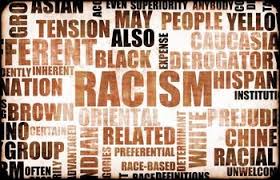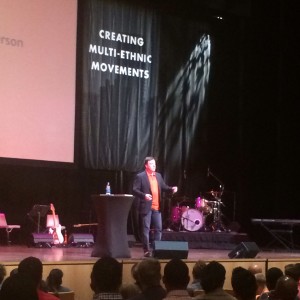Racial tension and conflict has flooded the news lately. Rather than point fingers and cast blame, I submit THE answer is quite simple. Not easy or quick, but transformational.
Racial (I prefer using the word ethnic) tensions exist in large part because we don’t listen to one another. It’s hard to understand someone who is different without knowing them. How many ethnically and culturally different people do we really know?
My Multiethnic Story
My father is half Chinese, hence my last name is Choy. My step sister is half African-American. My grandfather was an immigrant from China, my grandmother’s parents and grandparents were immigrants from the Czech Republic.
I’ve always had friends who were from diverse backgrounds. I played football in high school and many of my teammates were from diverse ethnic background. In college some of my closest friends were from other countries. The same is true about my wife.
The neighborhood we live in is in one of the most diverse cities in America (read more HERE). Our next door neighbors are from Vietnam, Ethiopia, Russia, Peru, Ecuador, and Washington, DC! That’s just on our block!
THE Problem
Could the problem of racial tension exist because of the ongoing segregation of churches? What about education, economic issues, power, and all manner of injustices?
Superficial change is not the answer. Hearts must change. The golden rule applies now more than ever. We must become a people who truly love our neighbors as ourselves. And if you haven’t looked out the window lately it’s likely that your neighbor doesn’t look, act, think, or live like you!
THE Answer
In April 2015 I attended the Kainos multiethnic leadership conference. Sociologist Dr. Michael Emerson shared five benefits of multiethnic churches. As a church planter of a multiethnic church (Restoration Church in Gaithersburg, MD) I was tuned in. Below is an adaptation from Dr. Emerson’s talk. This, I believe, is THE answer!
Dr. Emerson started with this quote from Dr. Benjamin May’s. Dr. May’s was a pastor, president of Morehouse College, author, and mentor to Dr. Martin Luther King, Jr.
“I hold, nevertheless, that my overall critique of the local church is accurate, and that it will be a sad commentary on our life and times if a historian writing in the year 2000 can still truthfully say that the most segregated institution in the United States is the Church of the Living God.”
Published shortly before his death in the 1960s. page 264 of his book, Born to Rebel: An Autobiography
The sad commentary that Dr. May’s was concerned with is still being written!
Segregated Churches Are Problematic
At least four problems are perpetuated in segregated churches:
1. They reproduce inequality. The have’s and the have not’s don’t change when we worship in churches with people like us. The cycle of inequality continues spinning.
2. Separation of friendship networks. People with resources tend to have friendship networks with people with resources. And vice-versa.
3. Strengthen racial division. We feel safe with people who look, think, act, and live like us. When we stay around people like us we only strengthen the divisions among us.
4. Heighten political conflict. If we’re surrounded by people in a church that are all red or all blue we limit our perspective. In that setting we tend to demonize the other side, cast stones, and turn deaf ears to those who have different views.
Good News!
The standard sociological definition of a multiethnic church is one in which no more than 80% of the congregation is one ethnicity. According to that definition the US has grown from 7% multiethnic in 1998 to 13% in 2012. My guess it’s grown closer to 15% in 2015. We’re making progress.
Here are the 5 benefits of multiethnic churches
1. Social ties. Multiethnic churches open access to friendships with people we may never otherwise develop.
2. Organizational home for multiracial families and people. The multiracial demographic is growing significantly.
3. Group formation and solidarity. A unified multiethnic church has immense potential to organize groups that impact their community and world.
4. Altered racial attitudes. It’s impossible for racial biases to stay the same when your close friends and coworkers in the church are from diverse background.
5. Reduced inequalities: economic, social, spiritual. Proximity and access to economic, social, and spiritual resources change the landscape of the culture and society like nothing else can. Where else will this happen if it doesn’t happen in multiethnic churches?
Dr. Emerson says, “Religion has immense potential to reduce racial inequity and division.” At the same time, “We’ve never seen an institution more segregated than the church!”
Planting new multiethnic churches and helping existing churches become multiethnic is one of my driving passions. If this movement does not succeed I fear the legitimacy of our Good News message will continue loosing ground and become irrelevant.
Referring to multiethnic churches, Dr. Emerson concludes:
“Such congregations, in addition to whatever else they do, must be part of a movement toward equality for God’s people, or the movement will have failed.”


I agree with your point that multiethnic churches can help you develop relationship with people you may not otherwise develop. I think it’s important for ministries to find a way to reach out to be more inclusive of those of more diverse origins or backgrounds. It may even be wise to find a coach who can advise your group on how to do this effectively.
Hey Bernard, thank you for the comment! And yeah, we are a very diverse ministry. We have a pastor from Brazil, and one who is Vietnamese-American. We have a high percentage of Spanish speaking congregants, and love love love the diversity. It’s not always easy, but it’s just better.